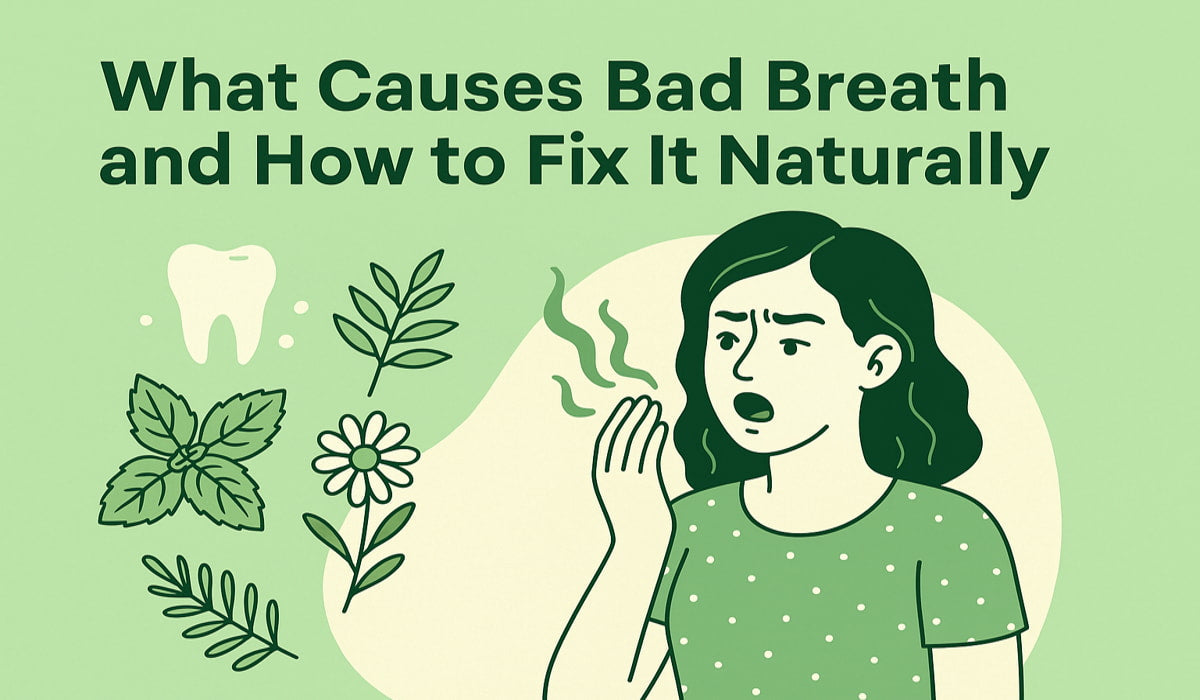Bad breath, also called halitosis, isn’t just embarrassing; it can be a red flag for deeper health issues. From poor oral hygiene to certain foods, dry mouth or gut imbalances, several factors can cause unpleasant breath.
The good news? You can often freshen your breath naturally by making simple changes to your routine, diet and daily habits.
Read on to discover the most common causes of bad breath and natural remedies that actually work.
Ready to Say Goodbye to Bad Breath?
At BreezeCare, we know how frustrating it is to deal with ongoing bad breath, even when you're doing all the right things like brushing and flossing daily. If nothing seems to be working, it might be time for a more targeted solution.
Book a consultation today and take the first step towards fresher, healthier breath naturally.
What Is Bad Breath?
Bad breath, or halitosis, refers to an unpleasant smell coming from the mouth that can be noticeable when speaking, breathing or even just sitting quietly. It's often caused by the release of odorous compounds, most commonly volatile sulphur compounds (VSCs), which are produced when bacteria in the mouth break down food particles, plaque and dead cells.
This process tends to occur on the tongue, gums and between the teeth, especially if oral hygiene is poor. Other common contributors include dry mouth (xerostomia), which reduces saliva’s natural ability to rinse away debris and bacteria.
Certain foods like garlic and onions can also cause bad breath, as their compounds may linger even after digestion.
Common Causes of Bad Breath
In some cases, bad breath might also be linked to underlying health issues, such as:
1. Bacterial Build-Up in the Mouth
The mouth is home to hundreds of bacterial species. When oral hygiene is inadequate, these bacteria feed on leftover food particles, releasing foul-smelling compounds. This is especially common on the tongue, the back of the throat and between the teeth.
2. Dry Mouth (Xerostomia)
Saliva is essential in neutralising acids and washing away dead cells and food debris. A dry mouth, whether from medication, dehydration or mouth breathing, reduces saliva flow, allowing bacteria to thrive and bad breath to develop.
3. Gum Disease (Periodontal Disease)
Chronic bad breath may be linked to gum disease, where bacteria collect under the gumline and release strong odours. If left untreated, gum disease can also lead to tooth loss and other health issues.
4. Diet and Lifestyle Habits
Foods such as garlic, onion, spicy dishes, coffee and alcohol can all contribute to temporary bad breath. Similarly, smoking or using tobacco products leaves a lasting smell and increases the risk of gum problems.
5. Medical Conditions
Persistent halitosis can be linked to sinus infections, acid reflux, tonsillitis, post-nasal drip or even digestive issues. That’s why it's important to consult with a professional if natural remedies aren’t working.
Natural Ways to Fix Bad Breath
Commercial mouthwashes and sprays can be a helpful part of your oral care routine, but for long-lasting freshness, it's also important to support your breath naturally. Here are some simple, effective ways to complement your dental products and tackle bad breath at its source:
1. Practice Proper Oral Hygiene
Brush your teeth at least twice a day using a soft-bristled toothbrush. Don’t forget to floss daily to remove plaque and food particles between the teeth. Use a tongue scraper to remove bacteria from the surface of the tongue, a major contributor to odour.
Pro tip: Visit your dentist regularly for professional cleaning and checkups. Prevention is always better than a cure.
2. Stay Hydrated
Drink plenty of water throughout the day to maintain saliva production. A hydrated mouth is a cleaner mouth, and it helps flush out odour-causing bacteria naturally.
3. Use Natural Mouth Rinses
Try rinsing your mouth with warm saltwater or a mix of baking soda and water to neutralise odours. These simple rinses can kill bacteria and freshen breath without chemicals.
4. Chew Natural Breath Fresheners
Chew on parsley, mint leaves, cloves or fennel seeds after meals. These herbs and spices are rich in chlorophyll and have natural deodorising properties.
5. Eat a Balanced Diet
Crunchy fruits and vegetables like apples, carrots and celery can help clean teeth and stimulate saliva. Avoid sugary snacks and acidic drinks, which can feed bacteria and cause plaque build-up.
7. Limit Trigger Foods
Avoid or reduce intake of known breath offenders like garlic, onions and strong spices before social events. Opt for milder ingredients that won’t linger on your breath.
When to Seek Professional Help
If your bad breath is persistent despite trying these natural remedies, it may be time to visit a dental professional. At BreezeCare, we offer comprehensive halitosis assessments to identify the root cause and recommend personalised treatment options, including:
-
Bacterial testing
-
Tongue and throat evaluations
-
Dry mouth assessments
-
Breath gas analysis (OralChroma™ technology)
We take a holistic approach to oral health, combining the latest technology with natural support to help you regain confidence in your breath.
Final Thoughts
Bad breath is a common yet manageable condition. By understanding its causes and adopting natural, daily habits, you can enjoy fresher breath and improved oral health. And remember, if home remedies aren’t enough, BreezeCare is here to help with expert advice and innovative treatment solutions.
Looking for a long-term solution to bad breath in Australia? Book your consultation with BreezeCare today and take the first step toward a fresher, healthier smile.











